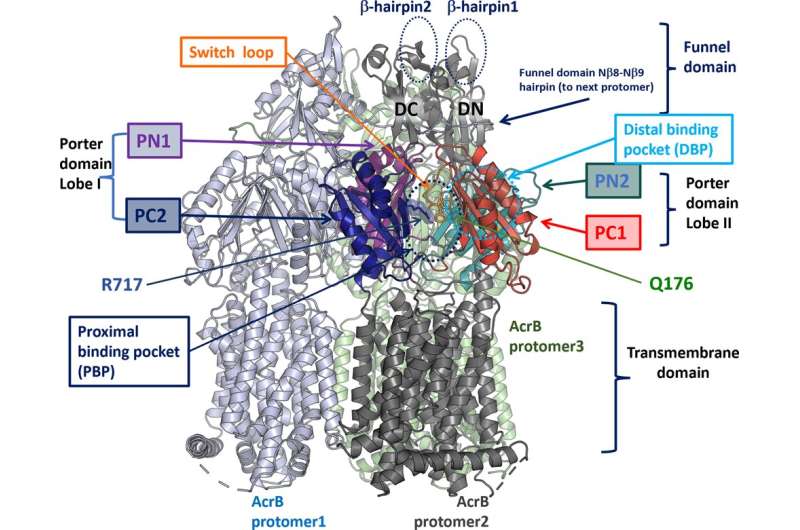This article has been reviewed according to Science X's editorial process and policies. Editors have highlighted the following attributes while ensuring the content's credibility:
fact-checked
trusted source
proofread
How bacteria evolve resistance to antibiotics

Bacteria can rapidly evolve resistance to antibiotics by adapting special pumps to flush them out of their cells, according to new research from the Quadram Institute and University of East Anglia. The study is published in the journal npj Antimicrobials and Resistance.
Antimicrobial resistance is a growing problem of global significance. The rise of resistant "superbugs" threatens our ability to use antimicrobials like antibiotics to treat and prevent the spread of infections caused by microorganisms.
It is hoped that the findings will improve how antibiotics are used to help prevent further spread of antimicrobial resistance.
Prof Mark Webber UEA's Norwich Medical School, and the Quadram Institute, said, "Knowing the details of the mechanisms bacteria develop to become resistant is a key step to understanding antimicrobial resistance. We hope that this kind of work to understand when and how resistance emerges can help us use antibiotics better to minimize selection of resistance."
The team studied how exposure to antimicrobials leads to the emergence of resistance.
Broadly, superbugs' defenses against antibiotics involve inactivating or evading drugs, stop them getting into their cells, or getting them out of their cells before they can have any effect. But exactly how they do this is still being worked out.
In this new study Dr. Eleftheria Trampari from QI, Prof Webber, and colleagues recreated the evolutionary stresses that lead to antimicrobial resistance by exposing Salmonella bacteria to two different antibiotics.
The bacteria were allowed to grow and reproduce in two different states that mimic how they live in the environment.
Some were planktonic—floating in a liquid broth—but others were in biofilms. Bacteria form biofilms on surfaces, as a way of protecting themselves against stresses and most bacteria in the real world exist in a biofilm.
Hundreds of generations of bacteria were grown and exposed to the antibiotics, and in this evolution simulation, survival of the fittest selected those bacteria best adapted to cope with the presence of the antibiotics.
To identify how these "winners" had become resistant, the researchers sequenced the genomes of the resistant bacteria, to identify which genes had changed compared to their non-resistant ancestors.
They found that both antibiotics selected different mutations in a molecular pump that Salmonella uses to get rid of toxic compounds from inside its cells. With colleagues from the University of Essex and University of Cagliari, they found that these two different changes altered how the pump worked in totally different ways. One made it easier for the pumps to catch drugs, the other made it easier for drugs to slide through the pump.
A search of a databases of genomes of Salmonella isolates found that one of these mutations has also arisen multiple times in the real world, in Salmonella from patients, livestock and food in the UK, US and EU, as far back as 2003.
The findings confirm a primary role for these pumps as the first line of defense against antimicrobials.
"This work simulates what happens in the real world where bacteria are constantly exposed to varying concentrations of antimicrobials," said Dr. Eleftheria Trampari from the Quadram Institute and first author on the study.
"Studying how resistant strains emerge and predict which drugs they will not respond to can be helpful in developing diagnostics and treatment strategies."
More information: Eleftheria Trampari et al, Functionally distinct mutations within AcrB underpin antibiotic resistance in different lifestyles, npj Antimicrobials and Resistance (2023). DOI: 10.1038/s44259-023-00001-8
Provided by University of East Anglia



















